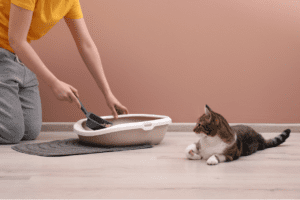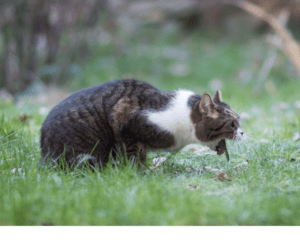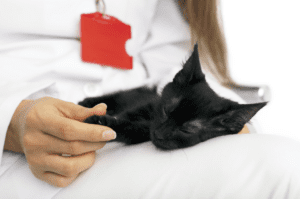For pet owners, seeing blood in cat poop can be alarming. Does it indicate a serious underlying health issue, or is it something to overlook? There can also be an instance where there’s blood in cat stool but acting normal.
Keep reading to learn “what does it mean when a cat poops blood?”, and how to respond appropriately to finding blood in a cat’s stool.
What Does It Mean When There’s Blood in Your Cat’s Poop?
Sometimes, cat stool can have blood at its tail end or mixed throughout the poop. In more severe cases, the cat can excrete blood alone. Experts call this phenomenon hematochezia or melena.
A critical distinction between melena and hematochezia is that in the former, stool appears dark due to digested blood from the stomach and small intestine. Hematochezia occurs when there is fresh blood from the anus, rectum, or colon of the cat.
There might be blood in cat stool but acting normal or other symptoms depending on where the blood comes from in the cat’s gastrointestinal tract.
- Worms or mucus with the poop
- Metallic-smelling stool
- Lumps or masses around the cat’s anus
- Discharge from below the cat’s anus (perianal skin or anal glands)
- Cat has difficulty during defecation
Is Blood in Your Cat’s Poop Considered an Emergency?
Usually, the best way to deal with finding blood in a cat’s poop is to seek veterinary attention. Even if there’s blood in cat stool but acting normal, there might be an underlying injury or disease that needs immediate care.
Here are a few reasons for concern that pet owners must look out for:
- The cat secretes large amounts of blood in their feces.
- The cat shows lethargy, depression, loss of appetite, and trauma or pain while defecating.
- The cat does not defecate within 24 to 48 hours.
- The cat is a newborn.
The situations mentioned above require immediate veterinary care. However, a few home remedies are available to pet owners who cannot go to the veterinarian immediately.
- Sometimes, cats become constipated because of ingesting their fur balls. Pet owners may give a paraffin-based pet laxative according to manufacturer instructions or a teaspoon of cod liver oil to help the cat defecate.
- Pet owners can use a dewormer according to package instructions if there are worms in the cat’s stool.
- Pet owners may add fiber to their cat’s diet if the cat shows no other symptoms. For example, a teaspoon of psyllium husk, mashed pumpkin, and regular cat food can help digestion.
What Can Cause Blood in Your Cat’s Poop?

What causes blood stool in cats? As furparents, know that Digestive disorders, specifically colon or rectum diseases, stomach and minor intestine illnesses, and anal diseases, may cause blood in the cat’s feces. Systemic conditions, such as clotting disorders, can also trigger this phenomenon. For instance, the cat may suffer from a congenital clotting disorder or poisoning from rat bait.
1. Colon or Rectum Diseases
Cats can experience infection, parasites, inflammation, and benign growths in their colon and rectum. The diseases mentioned above may cause the cat’s stool to turn smelly and have blood in it.
- Colitis, the inflammation of the colon’s inner lining, is one example. Due to the abnormal swelling, stool passing through the cat’s system can irritate the colon further.
- Similarly, polyps or benign growths in the bowel or rectum may cause blood in the cat’s feces. Various parasites, such as roundworms, coccidia, hookworms, and whipworms, may be excreted along with blood.
As mentioned earlier, it is ideal to consult a veterinarian for the appropriate treatment of these diseases.
2. Stomach and Small Intestine Diseases
Stomach or intestinal cancers, inflammatory bowel disease, gastric ulceration, foreign bodies in the cat’s system, and infection from parvovirus are all reasons for blood in feline feces.
- Chronic irritation of the stomach and small intestines may lead to inflammatory bowel disease in cats, which often causes blood in cat poop.
- Another possible situation involves parvovirus causing intestinal bleeding. The cat can partially digest the blood from the small intestine. It results in tarry feces or melena.
- Parasites can also cause gastric ulceration, where excessive stomach acid breaks the protective structures inside the stomach and intestines.
- Leiomyosarcoma, or stomach and intestinal cancer, is quite rare in cats, but it can also be the culprit behind blood in cat feces.
A great way to avoid these diseases is by providing the cat with a balanced diet and plenty of water and following the veterinarian’s advice. If, however, blood in stool and other symptoms occurs with a cat, it is best to seek veterinary advice immediately.
3. Anal Diseases
Cats are susceptible to trauma to the anus, perianal fistula and tumors, and anal gland abscesses and tumors.
- Perianal fistula is a painful disorder that affects a cat’s anus, rectum, and perineal regions. These areas become inflamed and irritated, which makes defecating painful and sometimes bloody for felines.
- Sometimes, the anal glands of a cat become infected, clogged, or abscessed. This situation also makes it hard for the cat to secrete waste. It may also lead to ruptures and bleeding during defecation.
As such, cats must undergo regular veterinary check-ups at least once a year. Here, veterinarians may spot some concerns and recommend the appropriate treatment. If pet owners see blood in their cat’s stool, it is always a good idea to seek veterinary advice as soon as possible.
Conclusion
Plenty of cats can experience blood in cat stool but acting normal. Some are fortunate to have fur-parents that ensure their health and safety. However, some cats aren’t as lucky.
How can you help? Visit Doobert now to become a volunteer and help the animals in your community. You can also shop on their website to support the animal rescue of your choice!








